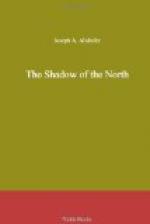He seemed to be much moved, and spoke a long time in the same vein, but his Indian wife never said a word. She moved about now and then, and, as before, her footsteps making no noise, being as light as those of any animal of the forest.
The dusk came up to the door. They heard the ripple of the creek, but could not see its waters. Madam Johnson lighted a wax candle, and Colonel Johnson stopped suddenly.
“I have talked too much. I weary you,” he said.
“Oh, no, sir!” protested Robert eagerly. “Go on! We would gladly listen to you all night.”
“That I think would be too great a weight upon us all,” laughed Colonel Johnson. “You are weary. You must be so from your long marching and my heavy disquisitions. We’ll have beds made for you three and Joseph here. Molly and I sleep in the next room.”
Robert was glad to have soft furs and a floor beneath him, and when he lay down it was with a feeling of intense satisfaction. He liked Colonel William Johnson, and knew that he had a friend in him. He was anxious for advancement in the great world, and he understood what it was to have powerful support. Already he stood high with the Hodenosaunee, and now he had found favor with the famous Waraiyageh.
They left in the morning for Mount Johnson, and there were horses for all except the Indians, although one was offered to Tayoga. But he declined to ride—the nations of the Hodenosaunee were not horsemen, and kept pace with them at the long easy gait used by the Indian runner. Robert himself was not used to the saddle, but he was glad enough to accept it, after their great march through the wilderness.
The weather continued fine for winter, crisp, clear, sparkling with life and the spirits of all were high. Colonel Johnson beckoned to Robert to ride by the side of him and the two led the way. Kegneghtada, despite his extreme youth, had refused a horse also, and was swinging along by the side of Tayoga, stride for stride. A perfect understanding and friendship had already been established between the Onondaga and the Mohawk, and as they walked they talked together earnestly, young Brant bearing himself as if he were on an equal footing with his brother warrior, Tayoga. Colonel Johnson looked at them, smiled approval and said to Robert:
“I have called my young brother-in-law an eagle, and an eagle he truly is. We’re apt to think, Mr. Lennox, that we white people alone gather our forces and prepare for some aim distant but great. But the Indian intellect is often keen and powerful, as I have had good cause to know. Many of their chiefs have an acuteness and penetration not surpassed in the councils of white men. The great Mohawk whom we call King Hendrick probably has more intellect than most of the sovereigns on their thrones in Europe. And as for Joseph, the lad there who so gallantly keeps step with the Onondaga, where will you find a white boy who can excel him? He absorbs the learning of our schools as fast as any boy of our race whom I have ever known, and, at the same time, he retains and improves all the lore and craft of the red people.”




